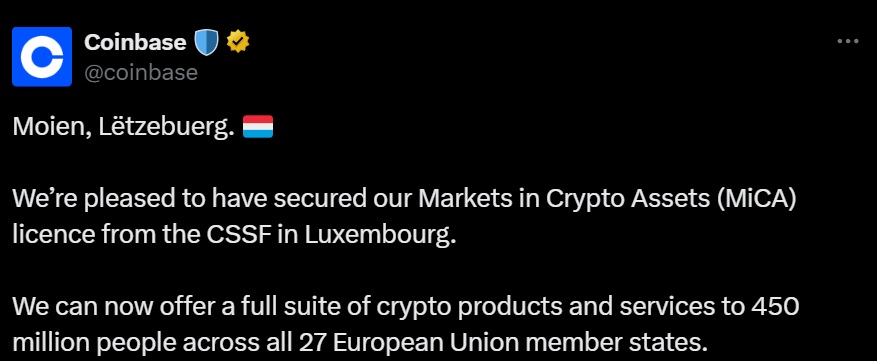TL;DR
- Coinbase became the first U.S.-based crypto exchange to obtain a MiCA license in the European Union, granted by regulators in Luxembourg.
- The exchange will move its regional base from Ireland to Luxembourg, leveraging this new authorization to operate across all 27 EU member states.
- The approval gives Coinbase a head start over competitors like Gemini, securing a commercial advantage as the European crypto market begins formalizing operations.
Coinbase became the first U.S.-headquartered cryptocurrency exchange to secure a MiCA license within the European Union.
The authorization was issued by Luxembourg’s Commission de Surveillance du Secteur Financier (CSSF), allowing the company to operate under the EU’s new regulatory framework governing the crypto market across all 27 member countries.
With this move, Luxembourg will now serve as Coinbase’s operational hub for the region, replacing Ireland, which had been the firm’s European base since 2023. MiCA requires exchanges to hold a single license enabling them to provide crypto services throughout the EU under a unified set of rules designed to standardize criteria and improve consumer protection.
Coinbase Moves Ahead of Competitors
The company pointed out that registering in Luxembourg puts it ahead of other international exchanges still working through their approval processes. Meanwhile, Gemini, another U.S.-based exchange, remains in the process of securing a similar license in Malta, the jurisdiction it selected for its European operations. That application was announced in January and has yet to receive official confirmation.
The European Crypto Market Moves Toward Regulation
For Coinbase, obtaining the MiCA license provides a competitive edge in a market where regulation has become essential for scaling operations in an orderly way. The new EU framework came into effect in late 2024, requiring digital asset service providers to comply with standardized rules — a requirement many firms have yet to fulfill.
Coinbase now has the opportunity to accelerate its expansion in a market still undergoing formalization. The expectation is that this early advantage will allow the company to consolidate its presence before rival exchanges secure regulatory clearance and adjust their operations to meet MiCA requirements ahead of the transition deadline













